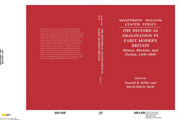Book contents
- Frontmatter
- Contents
- Preface
- WOODROW WILSON CENTER SERIES
- 1 Introduction
- 2 Precept, example, and truth: Degory Wheare and the ars historica
- 3 Truth, lies, and fiction in sixteenth-century Protestant historiography
- 4 Thomas More and the English Renaissance: History and fiction in Utopia
- 5 Little Crosby and the horizons of early modern historical culture
- 6 Murder in Faversham: Holinshed's impertinent history
- 7 Foul, his wife, the mayor, and Foul's mare: The power of anecdote in Tudor historiography
- 8 Experience, truth, and natural history in early English gardening books
- 9 Thomas Hobbes's Machiavellian moments
- 10 The background of Hobbes's Behemoth
- 11 Leviathan, mythic history, and national historiography
- 12 Protesting fiction, constructing history
- 13 Adam Smith and the history of private life: Social and sentimental narratives in eighteenth-century historiography
- 14 Contemplative heroes and Gibbon's historical imagination
- Contributors
- Index
- Titles in the series
10 - The background of Hobbes's Behemoth
Published online by Cambridge University Press: 04 August 2010
- Frontmatter
- Contents
- Preface
- WOODROW WILSON CENTER SERIES
- 1 Introduction
- 2 Precept, example, and truth: Degory Wheare and the ars historica
- 3 Truth, lies, and fiction in sixteenth-century Protestant historiography
- 4 Thomas More and the English Renaissance: History and fiction in Utopia
- 5 Little Crosby and the horizons of early modern historical culture
- 6 Murder in Faversham: Holinshed's impertinent history
- 7 Foul, his wife, the mayor, and Foul's mare: The power of anecdote in Tudor historiography
- 8 Experience, truth, and natural history in early English gardening books
- 9 Thomas Hobbes's Machiavellian moments
- 10 The background of Hobbes's Behemoth
- 11 Leviathan, mythic history, and national historiography
- 12 Protesting fiction, constructing history
- 13 Adam Smith and the history of private life: Social and sentimental narratives in eighteenth-century historiography
- 14 Contemplative heroes and Gibbon's historical imagination
- Contributors
- Index
- Titles in the series
Summary
It is a thing very dangerous for men to gouerne themselues by examples, if there be not a concurrence of the same reasons, not onely in generall, but euen in all particularities; and if things be not ruled with the same wisedome: and if lastly, ouer and besides all other foundations, the selfe same fortune haue not her part.
– Francesco Guicciardini, The Historie of GuicciardinLet me confess at the outset that this will be a very speculative essay, about a work that appears to sort oddly with the rest of the Hobbes canon. While it seems a little unkind to blame the subject of my inquiry for the difficulty of the endeavor, the fact remains that Thomas Hobbes controlled with great care what he wished posterity to remember, not merely by means of the various versions of his autobiography but even in his conversations with his garrulous friend, John Aubrey. Hobbes was reluctant, as a matter of principle, to name intellectual ancestors, either directly or by way of citation. Like Francis Bacon, he castigated the use of authority; unlike Bacon, he acted on what he preached. Central to Hobbes's conception of himself, even though it was not an entirely accurate description of his philosophy, was the Euclidean metaphor, the notion that an entire, coherent, and true system could be built on the basis of a few axioms. Like Athena springing fully armed from the head of Zeus, the world of Leviathan and its associated works was to appear as if it had sprung in its entirety solely from the brain of Hobbes.
- Type
- Chapter
- Information
- The Historical Imagination in Early Modern BritainHistory, Rhetoric, and Fiction, 1500–1800, pp. 243 - 266Publisher: Cambridge University PressPrint publication year: 1997



